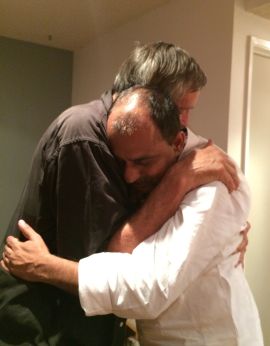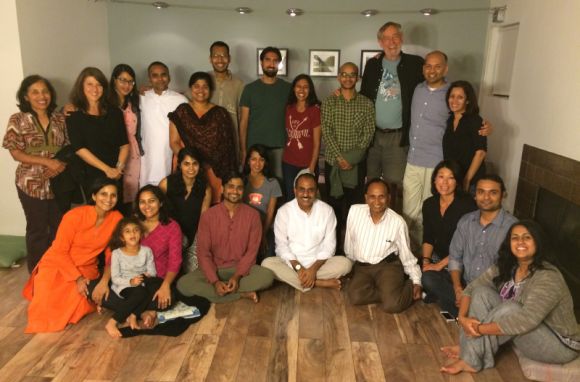Evening With Jayesh-bhai
 We were honored to host a circle of sharing with Jayesh-bhai and Mukesh-bhai last night. From personal stories -- like how Ami does the Gandhi Ashram prayers with her kids every night -- to emergent ones -- like a gentleman telling Mark Dubois how his life work influenced billions of dollars of change at his work in the energy industry -- to the beautiful ways in which Jayesh-bhai has personally touched us, through a multitude of experiences -- and the informal stories that unfolded in the post-dinner hour, we were all felt grateful to share so much love with each other!
We were honored to host a circle of sharing with Jayesh-bhai and Mukesh-bhai last night. From personal stories -- like how Ami does the Gandhi Ashram prayers with her kids every night -- to emergent ones -- like a gentleman telling Mark Dubois how his life work influenced billions of dollars of change at his work in the energy industry -- to the beautiful ways in which Jayesh-bhai has personally touched us, through a multitude of experiences -- and the informal stories that unfolded in the post-dinner hour, we were all felt grateful to share so much love with each other!
Some of the questions in our minds were: "What inspires/motivates you into service on a day to day basis?" "You recently shared that the way to a person's heart is through the doors of their virtues, not the walls of their faults. Can you elaborate?" "In the US, many battle loneliness, isolation, or lack of community. What lessons have you learned on building community?" We started the night's discussion with this question: "After your decades of work, you once reflected that service is never about resolving someone else's financial poverty, it is always about addressing our own spiritual poverty. Could you share more on this?"
Below are some of the notes ...
Jayeshbhai:
--It is important to bring awareness to seeds, it is through this that one’s awareness of lineage comes to focus. You have heard the story of Newton and how he discovered gravity when an apple fell on his head. But I want you to know about the man who asks how the apple got up on that tree in the first place. The man who thinks deeply about how much faith it must have taken to plant that first apple-seed, nurture it with fertilizer and water, the joy it must have brought when the first sapling peered out of the soil, the effort it took to build a fence to protect it, the dozens of apples it then produced, each one of which could then produce dozens more and so on. How much faith in the process it must have taken for that person to plant that first seed. How much gratitude must we have for the lineage that brought this apple into existence, so also for the lineage that brought us into existence with so much faith and love? From the lineage of our family, the lineage of our work, the lineage of our friends, to the lineage of the brothers and sisters in need who provide an opportunity to serve, an awareness of the seeds make the fruits easy to appreciate.
--Why do we work, why do we serve? For cleansing our heart, for our inner transformation. Where some see a request for help, I see an opportunity for inner transformation.
--Yesterday we talked about “to love is to serve”. It is when you step outside the equation of give and take that both (the giver and receiver) expand, both grow, both learn.
--Your spiritual power grows and your heart cleanses when you commit to not harming others, a commitment borne out of the understanding that your progress is linked to theirs. Sacrifice, borne out of such understanding, sharing borne out of such understanding, is manifest divinity. This innate divinity is in each of us, but the path to awaken it is through service.
--When Gandhiji wrote the first draft of his autobiography, he asked Vinoba Bhave to proof-read it and make suggestions. Vinobaji read it and gave it back to Gandhiji with the following comment “Nobody will be harmed by this”. Gandhiji stated this was exactly what he wanted to know. Underlying this exchange was Gandhiji’s knowledge all our external efforts are for naught. It is when you sublimate yourself (become ‘zero’), when the self becomes the vehicle, that your essence blossoms. In his zero, his essence was blossoming. And to transform others, you have to help them find their essence. The essence of any project we do is in figuring out how to connect hearts.
--When Vinoba Bhave conducted is walking pilgrimage across thousands of miles, most would say his goal was to redistribute land to farmers by convincing landowners to give away their land, but he insisted that fusing together the hearts of people was his goal. The idea with these projects is not to work for an outcome (parinam), but to work for the global family (parivar).
Experiences with Ishwarkaka (Jayeshbhai’s father):
--My father had cancer. When he was diagnosed the doctor said he had no more than 3 months to live – it had spread to his lungs. I asked the doctor if I should tell my father. The doctor advised against it because he had seen other patients go into severe depression. But the doctor didn’t know my father like I did. When I told my father that he had a very short time to live, no more than 3 months, he smiled and said “I am pleased that I did all that I could with my life. I am ready to die tomorrow, I am ready to die today.” The essence of his lifetime of service came forth in the form of his equanimity with death.
--Shortly after his treatment started they couldn’t find his vein, and had to puncture his vein 17 times. At this point he turned to the nurse and told them “You must be tired, you can stop”. In another instance, they made a cut to his right side, without anesthesia, and when he winced in pain, I couldn’t help but tear up. He saw me and asked me “Can you take my pain away?” I said “No, I’d like to, but I can’t”. “Then pray for me instead” he said, “but know that I am now like a coconut, they can knock around my outside, but my inside remains intact and untouched”
--Once I asked him “how will I continue this work and continue to serve as you have?” And he said, “replace your sense of burden (bhaar) with a strong positive intention (bhaav)”.
--Once my dad was still in the hospital, and it was Christmas. My daughter (his granddaughter) wanted to celebrate with him, so brought Christmas decorations, and began decorating the hospital room. As soon as she started, my father protested through the oxygen mask and other paraphernalia. When asked what the matter was, it turns out he didn’t want my daughter to put scotch tape on the hospital walls, because it would ruin the walls of a facility and that didn’t seem right to him.
--He viewed death as a gift from the divine.
On advice for the West on compassion
--We cannot dispense advice, but like Gandhi said we can only “be the change”. The phrase “turn the searchlight within” comes to mind as well. All paths to transformation begin with small acts. Like Mother Teresa said “There are no great acts, just small acts done with great kindness”. And to do so one need to keep the heart at the center, and allow the head and hands to follow the directive of the heart. With virtual sharing these small acts can multiply; so also in staying true to this notion of ‘my benefit lies in the benefit of all; not my country, my city, but the good of the world”.
Mukeshbhai
--My life's work is in transforming from patterns of pain/suffering to patterns that bring peace/joy
--The control we want and imagine we have in our lives, seldom exists. The force that dominates our life events are karmic seeds that have been sown by us. The constant sowing of positive seeds is essential. Each unskillful thought pattern, or subconscious mental habit sows negative seeds. And if we sow negative seeds we cannot expect good outcomes.
--If you want peace you will need to cultivate a constantly alert state of mind to guard against the subconscious system taking over. In the absence of a consciously cultivated system, this is what happens. And because we feed it, its strength grows. But there are many systems of thought patterns that allow for peace and joy, which require strength to cultivate, strength that we have.
--We are reservoirs of love and peace, but the layers around our heart obstruct this hidden treasure; my interest is in using silent communication to break these barriers and plumb the deep reservoirs of love that we have.

Posted by Sima Sanghvi on Oct 23, 2015

